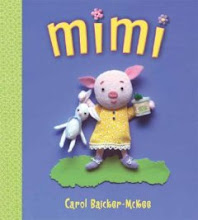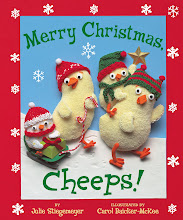 I went to sleep with no coffee in the house and when I woke up there was still no coffee in the house and the garbagemen came before I could stick the smelly leftovers in the can and then I found an even stinkier new statement from the CPSC about books, and I could tell it was going to be a terrible, horrible, no good, very bad day.
I went to sleep with no coffee in the house and when I woke up there was still no coffee in the house and the garbagemen came before I could stick the smelly leftovers in the can and then I found an even stinkier new statement from the CPSC about books, and I could tell it was going to be a terrible, horrible, no good, very bad day.I think I'll move to Australia.
If you've ever read this childhood classic by Judith Viorst with expressive black and white line illustrations by Ray Cruz (Atheneum, 1972,), I'm sure you get my literary allusion. And if not, here's the first page as a teaser - you have got to read this book, which is still completely relevant and delightful 37 years after it was published. It's just as appealing to adults as it is to kids.

Copyright 1972, Judith Viorst and Ray Cruz
So here's why it was a THNGVB day. The CPSC put up some new "helpful" powerpoint slides for their staff today (you can read them all here).Here's the line that's got me ready to move to Australia. Or, better yet, ready to make Congress move to Australia and let the country start fresh. Page 6 has the guidance on children's books (ordinary books safe if published after 1985, limited staff analysis has shown some lead in older books, blah, blah). And then this line:
(approx 20 years)
What planet do these people live on? Have they never heard of Winnie the Pooh? The Wizard of Oz? Peter Pan? Alice in Wonderland? Peter Rabbit? Charlotte and Wilbur? Mike Mulligan and Mary Ann? I could go on for quite a while.
Well, maybe, said my Devil's Advocate, they were referring to library copies which can get some pretty tough wear and tear. True - but libraries are still sweating bullets about having to purge the pre-1985 books from their collections, which makes me think those old books are surviving at a pretty high rate. Doesn't surprise me, when you consider the industrial strength of some of those bindings and the fact that past the age of 2 or 3 kids start to treat their books with a little more respect.


No, the CPSC's completely ignorant statement is the equivalent of saying that we have no need of Rembrandt, Matisse, or da Vinci paintings since some perfectly nice ones have been made in the last 20 years. No need of Shakespeare, Jane Austen or Dickens when you can read John Grisham or Janet Evanovich (not that I have anything against those latter authors - fine beach reading. In fact, Grisham could write a pretty good thriller featuring an evil congressman in cahoots with the consumer lobbyists and aided by a nefarious CPSC enforcer as they pursue a beautiful crafter fleeing with his movie-star beautiful fiancee, the vintage bookseller.)
I had started a completely different post about the impact of CPSIA on literacy programs (I've been collecting info from several prominent ones), the economics of binding, and the research on the link between lead poisoning and exposure to books and educational toys (which I have a feeling will surprise Congress). But I'll save it for tomorrow.
Let this sink in meanwhile: Mary Poppins: irrelevant. Pippi Longstocking: useless. Babar, Ferdinand, Curious George, Frances, Corduroy, Harriet the Spy, the Very Hungry Caterpillar, Madeline, the Borrowers, Little Tim, the Runaway Bunny, Max in his wolf suit, Horton and the Whos, the Grinch, Sam-I-Am, Amelia Bedelia: who needs them?

Now this book above you might argue is an example of why a children's book is "useless" after 20, well, more like 40-some years. As you can see from the cover, this volume has had a long, rough life. The Trolley Car Family by Eleanor Clymer (David McKay, 1947 - my copy is from the late 50s or early 60s) was one of the many books in my family's collection of "bathtub books." The house we moved into when I was 10 had a huge claw-footed bathtub on the third floor, and my sisters and I spent substantial chunks of our moody teens in it reading and re-reading our favorite childhood books. But even though this book's cover is rather the worse for the wear and it's a bit wrinkled from too much hot water and Calgon, it still has all its pages. Twenty years after its bathtub duty, my own kids enjoyed sharing the old-fashioned adventures of the family who was forced to move into the trolley car their dad drove until the trolleys were replaced by more modern buses, Pa lost his job, and the family was forced out of their home.

Come to think of it, a story about job loss, home foreclosure and useful things deemed obsolete doesn't sound so old-fashioned these days, does it?




















12 comments:
The more I read about the debacle of the CPSIA, the more frightened I get. Not so much because of the law itself (although that's horrible enough), but at my growing realization of what this means for the country as a whole.
America faces a terrible economic crisis, and government is intervening in every area of the economy to take over responsibility and control of solving this crisis. But, as the CPSIA story shows, the people who actually populate the federal government seem to be shockingly incompetent.
The same kinds of people that came up with the CPSIA are now using the same kinds of methods that produced that law to solve the banking crisis, to fix the recession, to save the auto industry, to implement universal health care, etc. It can't help but produce the same kinds of disastrous results.
I think there's a very real chance that the federal government is going to wreck the entire country before they're done.
Hi there - love this post!
Every day I hear a story about how the CPSIA is negatively impacting a small business or thrift shop.
Is there a way to access the CPSC and see the PPT?
Thanks.
Hi Angelle,
You can see the PPT from the link (the color of my links isn't showing up well - I'll change it in a minute) but it's the word "here" after my description of the CPSC's PPT show. If that doesn't work, you can get to it from the CPSC website at:http://www.cpsc.gov/about/cpsia/cpsia.html. The PPT is the second item under What's New, and the book stuff is on p. 6.
I'm also adding an image of the book Mine for Keeps that I discuss, if anyone's interested.
I'm wicked anti-CPSIA, but I think you misread this. I don't think they're saying that the shelf life of a story is 20 years, but a children's book itself. And, if my old library was any indication, they may be highballing it.
Hi Jeff,
I did realize that was probably at least part of what they meant (see my whole post), but they're as wrong about the shelf life of most children's books too. Okay, a baby's copy of Pat the Bunny might not hold up well, but even our family hardcover/paper copy of Goodnight, Moon by Margaret Wise Brown (printed before 1985 - gift to my son in 1987) is going strong even after having been read almost nightly to all three of my kids during their baby and toddler years. As I note above, my public library is packed with children's books well over 20 years and still in perfectly readable condition, and that's typical of libraries around the country. And the durability of older books is significant not just because old copies are cheaper to buy or because they make up big chunks of schools' and libraries collections, but because there are many, many, many outstanding children's books that have not been reprinted in the last 20 years - or if they were reprinted, they had only very small print runs (basically to supplement the older copies still in circulation) or in formats (like cheap or resized paperbacks) that pale next to the original versions. I think that CPSC is trying to reassure their staff and inspectors as well as the public that it doesn't matter that this law will basically wipe out most of the history of children's literature.
But they are WRONG. It does matter and people will fight them on this.
It's just incredible what's going on with this CPSIA nonsense. What you have here is an overruling of the normal practices and choices of millions of people by a government bureaucracy in the name of achieving some dubious higher good. This stupidity should be hounded out of existence even it takes something as radical as walling off the roads and bridges leading out of the District of Columbia. Let the people decide what to sell, what to keep and what to discard. Let them exercise their judgment without having to bow to the leaden hand of the Almighty State.
Another excellent post. I was likewise shocked by such a bizarre statement.
Mine for Keeps and Trolley Car Family are two of our favorites as well.
Thanks Headmistress. I'm increasingly convinced we have similar reading tastes (and experiences). I too read Phyllis McGinley's Sixpence in Her Shoe and found much interesting in it - but it was many years ago when I was in high school - time to read it again.
I'm a big fan of older books. I've got several books that are older than 100 years including one that is about 350 years old.
I don't have any kids now, but if I do they are going to get many of the same books that I read when I was little.
This whole thing is just heartbreaking. How can they even consider taking away older books??
Even IF they replaced old copies with new reprints, that doesn't make up for the loss. There is just something magical about holding an old book in your hands, and knowing that many others have held and read the same copy.
Old books are beautiful, and among my favorites. I buy them whenever I can, and now I'm going to do so even more!! I agree with anonymous above--I want my (future) kids to experience old books, so I guess I better start stockpiling now!
I'm stockpiling for my future grandkids (and myself). I get more concerned and depressed about this every day.
I cannot believe you mentioned Mine for Keeps. I just found Jean Little, reading her memoir Stars Come Out Within, having no idea who she was, only picking it up at our local library where they had it on display (thankfully!)because of her visual problems (been in the middle of my mom's - has the world gone crazy while I've been in the clouds with her? - I cannot believe all this about my old books - no! - oh, sorry, I am such an old book lover, this is just so unreal - oh, wait a minute, didn't we - no, I mean they - vote for CHANGE!
Donna (long-time follower of the Headmistress)
Post a Comment